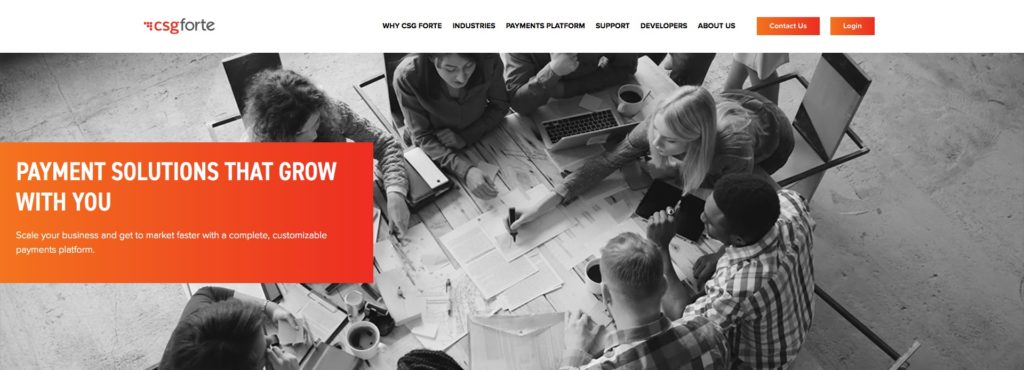Scaling digital payments smarter and growing businesses faster

From the renewed emphasis on contactless commerce to the promise of real-time payments, the business of facilitating transactions for goods and services is as hot a subsector of fintech as any other. To this end, we caught up with Jeff Kump, Head of Payments for recently rebranded CSG Forte, a unified payments platform based in Allen, Texas, to talk about innovations in payments, the power of enabling technologies, and the role played by companies like CSG Forte.

Since 2006, Kump has been tasked with leading and growing CSG Forte’s operational and cross-functional teams. Additionally, he has proven instrumental in advancing CSG Forte’s corporate development and growth strategy, serving as Forte’s COO and CFO before the company’s acquisition by CSG in 2018. During his tenure at Forte, the company was recognized by the Inc. 5000 as one of America’s Fastest Growing Companies for eight consecutive years. The company is an alum of our developers conference, FinDEVr, having hosted presentations on payment technology at events in 2014, 2015, and 2016.
What problem does CSG Forte solve and who does it solve it for?
Jeff Kump: To start, we offer one of the most complete and customizable payments solutions in the world, enabling companies to scale digital payments smarter and grow their business faster while also reducing costs.
Offered as a unified end-to-end payments platform, our technology was purposefully engineered to make it easy for companies and integrated software providers to set up, integrate, quickly adapt to changing needs and scale fast—because speed so often translates to success. We have done this by managing the entire payment lifecycle within a single platform, fueled by modern APIs and RESTful architecture that transforms their payments operations into a competitive business strategy.
This agile foundation has also helped us to succeed across hundreds of industries. It can be difficult to find a partner both competitive on price and legitimately equipped to provide the custom solutions necessary to succeed. Our team leverages deep yet specific channel expertise to support our customers’ verticals, including security, compliance, and integration.
Our unique approach to payments has enabled us to grow rapidly – outperforming larger competitors and transforming payments from an expense to a critical growth driver. From 2010 to 2018, Forte was, for example, listed on the Inc. 5000 list as one of America’s Fastest Growing Private Companies. Today, we work with over 70,000 merchants across hundreds of industries in North America.
What impact did the COVID-19 pandemic have on your business? What are some of the biggest takeaways from 2020?
Kump: When COVID hit, many companies were forced to transform how they interact and support their customers and employees. The pandemic also had a lasting impact on the payments industry, but maybe not in the way that many expected.
While contactless and mobile payments certainly received their fair share of attention, it was the rapid rally around electric payments that was critical to the success of social distancing, stay-at-home orders and bill payments. Merchants and governments across a range of verticals turned to CSG Forte to get smart in e-commerce – quickly enabling their websites to handle online orders, introducing store-specific apps that allow their customers to shop more easily from home or encouraging pay-by-phone.
We also saw a surge in self-service payments kiosks and anticipate this interest in these kiosks will increase for businesses and consumers alike who want to arm themselves against future emergencies, rely less on cash, and encourage social distancing habits post-pandemic. Kiosks are a flexible solution, offering a breadth of payment options to support both people using cash (including underbanked populations) and payers who prefer to avoid human interaction. Moving forward, you will see a rise in VR (Voice Response)-enabled and Conversational AI-enabled kiosks that minimize the number of times payers need to touch the screen or keypad.
Related to the rise of contactless payments, it has not all been hype. As consumers have returned to their normal in-person shopping habits, more and more merchants have turned to CSG Forte in the last year to put in place the point-of-sale infrastructure that supports contactless options and mobile pay.

Which of the main payment trends – digitalization, tokenization, contactless, the security/fraud challenge etc. – will have the most impact on payments in the near term? What will businesses need to do in order to successfully take advantage of these trends?
Kump: We think that digitalization is the most important trend for businesses to follow and act on right now – paving the way for the rise in virtual cards, contactless, and other payments advancements.
Reinforced by COVID, industries are shifting from paper methods to digital processes, and more transactions are taking place online. Digital payment solutions can improve security, accuracy, efficiency and profits, giving businesses a competitive advantage in a digital economy. For instance, ACH payments are more secure and considerably faster than paper checks, cost less to process, and leverage advanced technologies to protect against check fraud, data breaches, and identity theft.
The challenge of digitalization is addressing the security concerns it presents. With increasing digitalization, hackers gain more access to sensitive data, leaving individuals and enterprises vulnerable. Over half of U.S. merchants have faced a data breach at some point – in 2017, over 19% reported an incident. About 60% of consumers say they will actively avoid businesses that have experienced a recent data breach, especially when it involves credit card information.
With that in mind, businesses should invest in technologies such as End to End (E2E) encryption, EMV, and tokenization that can mitigate risk related to fraud and security breaches caused by bad actors. E2E encryption can be used alongside digital platforms that support point-of-sale (POS) transactions and IVR phone payments; the technology hides payment information and converts it into an unreadable code as it is transmitted across the payment network that is decrypted with a private key upon reaching the intended destination. Merchants who have POS devices that accept contactless payments are able to securely transmit payment data using EMV technology that works by generating a one-time transaction code. The code is unique to each purchase, eliminating the fraud risk of duplicate credit cards that often occurs with magstripe cards. Tokenization is used for eCommerce, recurring and automated transactions, and stored cardholder data. Tokens replace the payment data with a randomly generated code that can only be exchanged for real data by the payment processor that stores it. These are often used by merchants that offer automatic/recurring payments like subscription- or membership-based services. Tokens are easy to use and effective for the security they provide. Any cybercriminal that gets their hands on tokenized data will find it unreadable, as only payment processors can exchange tokens for real data, ensuring both external and internal protection.
Implementing secure technology such as E2E encryption and data tokenization can help protect businesses from enduring the negative and costly impact of fraud and data breaches that can also cause reputational harm to their brand. CSG Forte has several solutions that are out-of-box and/or easy to integrate and can reduce the scope and burden of managing PCI and Nacha compliance requirements. Businesses that do not have these protections in place should engage a trusted payment processor, such as CSG Forte, to assist with implementing these necessary security measures.
CSG Forte announced a partnership with CivicPlus this spring. This reflects one trend – government modernization – that was accelerated by the pandemic. Can you tell us more about the partnership, including how it came about?
Kump: Government modernization is a hot topic indeed. With many offices closed to the public in 2020 and into 2021, government agencies turned to CSG Forte to quickly evolve the way they do business. In response to sky-high demand, we doubled down on our partnerships and innovations that empower the government vertical in the last year – joining forces with CivicPlus, gWorks, SeamlessDocs, and Accela, to name a few. In 2020, we were also named a preferred partner by Nacha for Government Agency ACH Payment Gateways.
CivicPlus and our CSG Forte team have been bumping into each other for a couple of years now, having been involved in similar projects with local municipalities and state governments. After a few of these encounters, and one where we helped them to quickly get some new accounts deployed, the idea of a true partnership truly took root – and is what we announced this spring.
By partnering with CivicPlus, we can offer over 4,000 local governments a full end-to-end payments solution that accelerates the evolution of traditional payments services and meets the needs of today’s digital-savvy citizens while providing key capabilities needed to drive an industry-leading online payments experience. This includes:
- Enhanced security: E2E encryption protects sensitive card data throughout the transaction lifecycle
- Seamless payments: Secure, online payments received instantly through an intuitive, easy-to-use platform
- Check processing with verification: Gives government agencies the ability to accept checks with confidence, providing checking account validation. Verification capabilities meet new requirements set forth by Nacha
- Updated payment status: Automatically records the payments status to keep the system updated in real-time
What else can we expect from CSG Forte over the balance of 2021?
Kump: First off, we just rebranded the business. Previously known as Forte Payments Solutions, the holistic CSG Forte rebrand includes a new logo, website, and social pages that position CSG’s payments business for rapid growth into new regions and across the hundreds of verticals it serves.
As we look at innovation and product enhancements for the remainder of the year, our focus at CSG Forte is to simplify the customer experience and improve their journey. Consumers are increasingly interested in Apple Pay and Android Pay, among others, so we are enhancing our product roadmap to include digital wallet options for merchants. Additionally, we are transforming the way that we manage transaction monitoring to ensure a seamless processing experience for merchants.
Our customer-centric approach is also focused on developing solutions that minimize compliance burdens such as Nacha’s “Supplementing Fraud Detection Standard” mandate, which impacts many of our merchants who leverage ACH services, as well as accelerating value delivery to merchants by reducing onboarding time so they can begin processing transactions faster. We will continue to evolve our payments platform to align with the voice of the customer and ensure we are not only meeting but exceeding their expectations, making ordinary customer experiences extraordinary.
Jeff Kump is Head of Payments at CSG and leads the newly rebranded CSG Forte business, where he oversees go-to-market strategy and new opportunities in the global payments market. Kump previously served as Head of Operations for Forte, focusing on continuous business process improvement, risk and fraud management and providing an unparalleled customer experience.